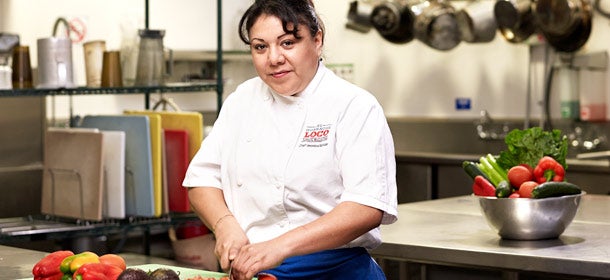 The Startup: El Huarache Loco in Larkspur, Calif., serves authentic Mexican street food cooked the same way Veronica Salazar's family has prepared it for nearly half a century in Mexico City. Salazar graduated from La Cocina's nonprofit incubator kitchen, which each year accepts up to 12 businesses run by low-income and immigrant women, teaches them how to develop a company and offers subsidized commercial kitchen space.
The Startup: El Huarache Loco in Larkspur, Calif., serves authentic Mexican street food cooked the same way Veronica Salazar's family has prepared it for nearly half a century in Mexico City. Salazar graduated from La Cocina's nonprofit incubator kitchen, which each year accepts up to 12 businesses run by low-income and immigrant women, teaches them how to develop a company and offers subsidized commercial kitchen space.What It Is: A kitchen-prep veteran, Salazar was eager to be chief cook and bottle washer of her own establishment, one that would provide a bona fide Mexican dining experience. She opened her 38-seat restaurant in March 2012, after first building her brand through a catering business and a stand at San Francisco's Alemany Farmers' Market. "Most of the Mexican street-food restaurants, the owners are American. They know the Mexican food, but they don't have the flavor," says Salazar, who worked in her family's restaurant and brought the secret recipes with her when she came to San Francisco in 1996.
Though she offers a full range of dishes, Salazar focuses on huaraches, corn masa cakes with beans and other toppings. Early on at the food stand, Salazar's customers requested burritos; she declined. "I don't want to be Taco Bell," she says. "[People] ask me for nachos with cheese and sour cream. We don't make that in Mexico City. I make the food with the same ingredients that my family uses."
Getting In: Salazar heard about La Cocina through Spanish cable channel Univision when the incubator launched in 2005. "I started [my business] with only $50, and I barely spoke English. I learned one word each day," Salazar says. "I didn't have a car; I didn't have anything." But she knew she had a good idea, and La Cocina agreed.
Salazar applied to the program while the nonprofit's offices were still under construction in San Francisco's Mission District. La Cocina evaluates applicants on the quality and viability of their product, as well as on entrepreneurial spirit. "She was in our first class of entrepreneurs. We all learned together," La Cocina executive director Caleb Zigas says. "She had a lot of the ingredients for success: She identified the market need--that there was no real authentic Mexican street food--and delivered it consistently and gracefully."
Salazar's restaurant is the first brick-and-mortar location opened by a La Cocina graduate. (Six more have followed.)
The Goods: Salazar says La Cocina assisted her through every step, from developing a business plan (in conjunction with fellow nonprofit The Women's Initiative for Self-Employment) to securing a spot at the farmers market, matching her with an investor, filing for permits, acquiring equipment and finding an architect.
Most businesses take about five years to graduate from La Cocina and become self-sustaining. "It's not about launch," Zigas says. "Launch is almost assumed. It's about growth and exit. We're about transforming patch income to asset generation, from bake sales to bakeries."
Lessons Learned: Be nimble, adaptable and patient. Salazar found that running the restaurant requires different skills than catering or working a farmers market stand. "Every day is new for me," she says. "It's hard to keep up, and sometimes there are a lot of problems with electricity and water."
Looking Ahead: With El Huarache Loco barely a year old, Salazar already dreams of opening another restaurant but wants "to grow more in this one first." The short-term goal is to expand the patio for more outdoor seating.
No comments:
Post a Comment